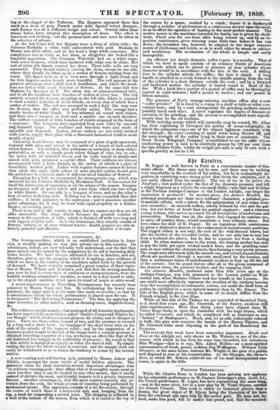t#t Otatrts.
M. Dugue is well known in Paris as a consummate master of dra- matic effects. His theme may not be new, and there may be nothing very remarkable in the conduct of his action, but he is surpassingly in- genious in contriving some strong point that rivets the attention, and is not easily effaced from the memory. The sea of ice in La priere des Haufrages, that melted under the feet of the dramatis pommy, and left a single fragment as a vehicle for one small child,—who that saw it either at the Parisian Ambign-Comique or the London Adelphi, can forget the impression it produced? In another piece, Les Amours Maudits, the principal personages are those very ordinary characters, a polished gen- tlemanlike villain, with a. talent for the perpetration of any crime how- ever recondite; an uncouth ruffian, utterly debased by vice and the gal- lies, but yet better at heart than his genteel employer; and a virtuous young woman, who serves as a mark for all descriptions of misfortune and persecution. Number two (in the above list) engaged by number one, to carry off number three, would constitute a very ordinary chase. But here comes the skill of hi. Dugue. By an ingenious little contrivance he gives a distinctive feature to the commonest of melodramatic positions. The rugged villain is not only the tool of the well-dressed knave, but also the brother of the intended victim, and he not only has to tear her from a husband she adores, but he has to separate her from a darling child. So when matters come to the worst, the doating mother has only to pop the little pet upon wicked uncle's knee, and the prattling inno- cent at once softens the obdurate heart, thus forming a very pretty picture. The rough man afterwards kills the smooth one, and certain aonnambulistic effects are produced through a narcotic swallowed by the heroine, and thus a continuous tissue of melodramatic incident is kept up till the fall of the curtain ; but the grand feature after all is the group composed of the anxious sister, the penitent brother, and the engaging child.
Les .Amours Maudits, produced more than four years ago at the- Ambigu-Comique, was first presented to the London public on Wed- nesday last, when Madame Celeste took her benefit at the Lyceum. No
one could more effectively represent the troubles of the virtuous heroine than this accomplished melodramatic actress, nor could the bluff form of pathos be exhibited in a more natural manner than by Mr. Emery. The title of the English piece, which in some of its details differs from the French original, is the Last Hope.
While on this side of the Thames we are reminded of theatrical Paris, as it stood four years ago, Mr. Creswick, of the Surrey, awakens stall
older reminiscences. More than thirty years have elapsed since M. Victor Hugo broke in upon the classicists with the huge drama, which he called Cromwell; and which he considered full as historical as any "history" of Shakspeare's. Much, and, let us add,judiciously reduced in bulk, this play now occupies the boards of the Surrey Theatre, and Mr. Creswick looks most imposing in the garb of his Excellency the Protector.
The revivals this week have been somewhat important. Masks and Faces at the Adelphi not only shows us Mr. Webster in one of the cha-
racters with which he has been for some time identified, but introduces Miss Woolgar—that is to say, Mrs. Alfred Mellon—as a most spirited representative of frank, genial, reckless Peg Woffington. Welcome Little Stranger, at the same house, restores Mr. Wright to the gaze of a public well disposed to roar at his eccentricities. At the Olympic, the Porter's Knot, in which Mr. Robson achieved one of his most distinguished suc- cesses, is again in the bills.


























 Previous page
Previous page